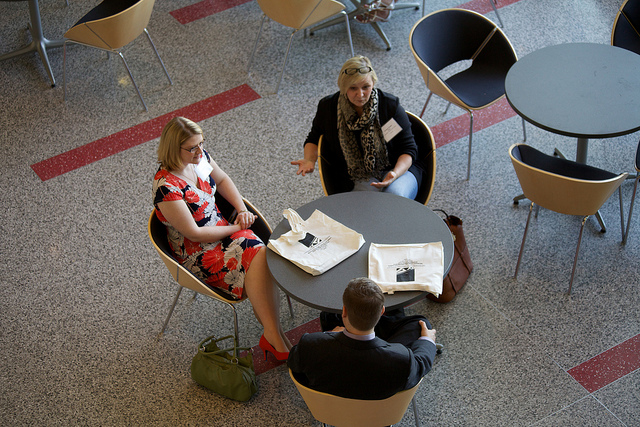 On April 12, 2014 over one hundred graduate students, faculty, staff, and community partners gathered in UMBC’s Performing Arts and Humanities Building for the Rethinking Intellectual Activism graduate student conference. Presenters represented UMBC’s Language, Literacy and Culture (LLC) Doctoral Program and the departments of Geography and Environmental Systems, Public Policy, Psychology, and Sociology, as well as universities across the country, such as UCLA, MICA, George Mason, and the University of Louisville, and the world, such as University of Oxford, England, Sabancı University, Turkey and North South University, Bangladesh.
On April 12, 2014 over one hundred graduate students, faculty, staff, and community partners gathered in UMBC’s Performing Arts and Humanities Building for the Rethinking Intellectual Activism graduate student conference. Presenters represented UMBC’s Language, Literacy and Culture (LLC) Doctoral Program and the departments of Geography and Environmental Systems, Public Policy, Psychology, and Sociology, as well as universities across the country, such as UCLA, MICA, George Mason, and the University of Louisville, and the world, such as University of Oxford, England, Sabancı University, Turkey and North South University, Bangladesh.
Presenters and attendees discussed a variety of topics connected to the notion of Intellectual Activism. They included: Social Justice Through Critical Participatory Action Research; Politics of Race, Ethnicity, Religion, and Gender; New Critical Perspectives on Service Learning and Community Engagement; Researching Political Action, Discourse, and Organizations; and Politics of Art and Art as Activism.
Dr. Kaye Whitehead, Assistant Professor of Communication at Loyola University and a graduate of the Language, Literacy and Culture Doctoral Program at UMBC, delivered the keynote speech, titled In Search of Your Magis: Taking a Moment to ReThink, ReEvaluate, and ReDiscover Intellectual Activism. In her speech grounded on the central question, “What kind of a scholar do you want to be?” and interwoven with episodes from her own inspiring life story, Dr. Whitehead talked about the importance of scholars finding their own paths to be/come intellectual activists or activist intellectuals who fight for social justice and make a difference in both others’ and their own lives through their knowledge practices.
Thanks to all the co-sponsoring academic departments, programs, and offices across the campus, whose support made this conference possible: LLC Doctoral Program; Office of the Vice President for Research; Department of Gender and Women’s Studies; LLC Graduate Student Organization; Department of Modern Languages, Linguistics, and Intercultural Communication; Department of American Studies; Department of Sociology and Anthropology; Department of English, and B’PAR Graduate Student Organization. Thanks also to the campus community of students, faculty members, and staff members, without whom this conference would remain as a dream. Next year’s LLC Graduate Student Conference is expected to add to the critical dialogues stimulated in this year’s conference.
Tags: LLC
